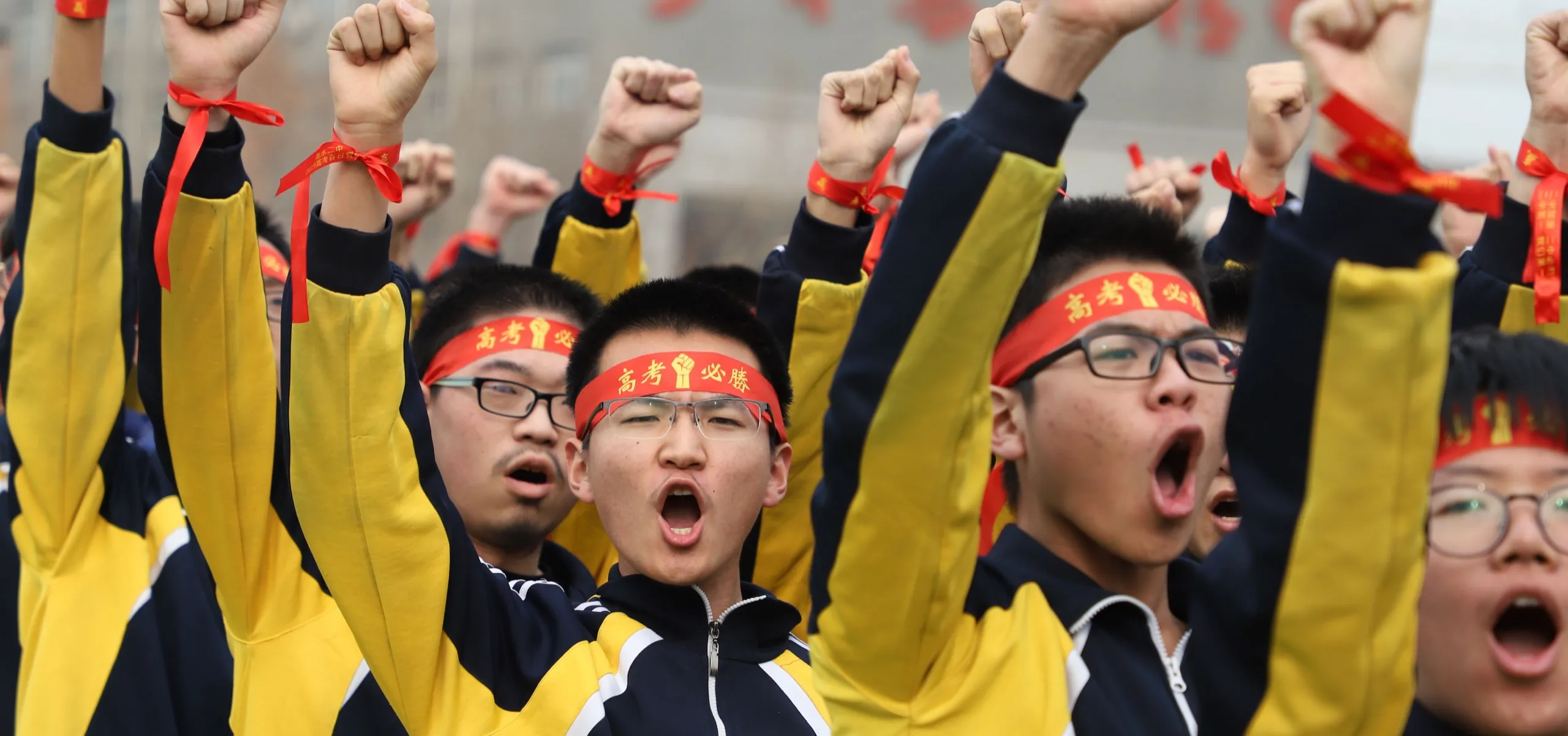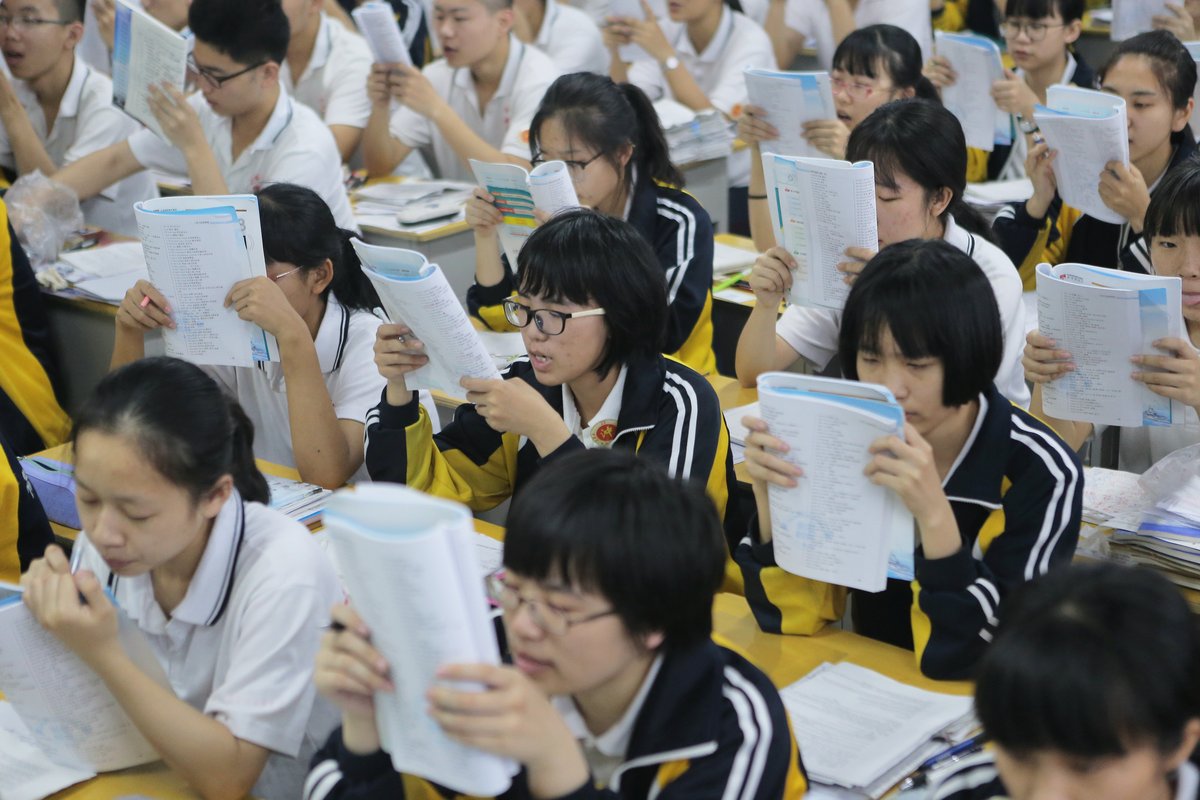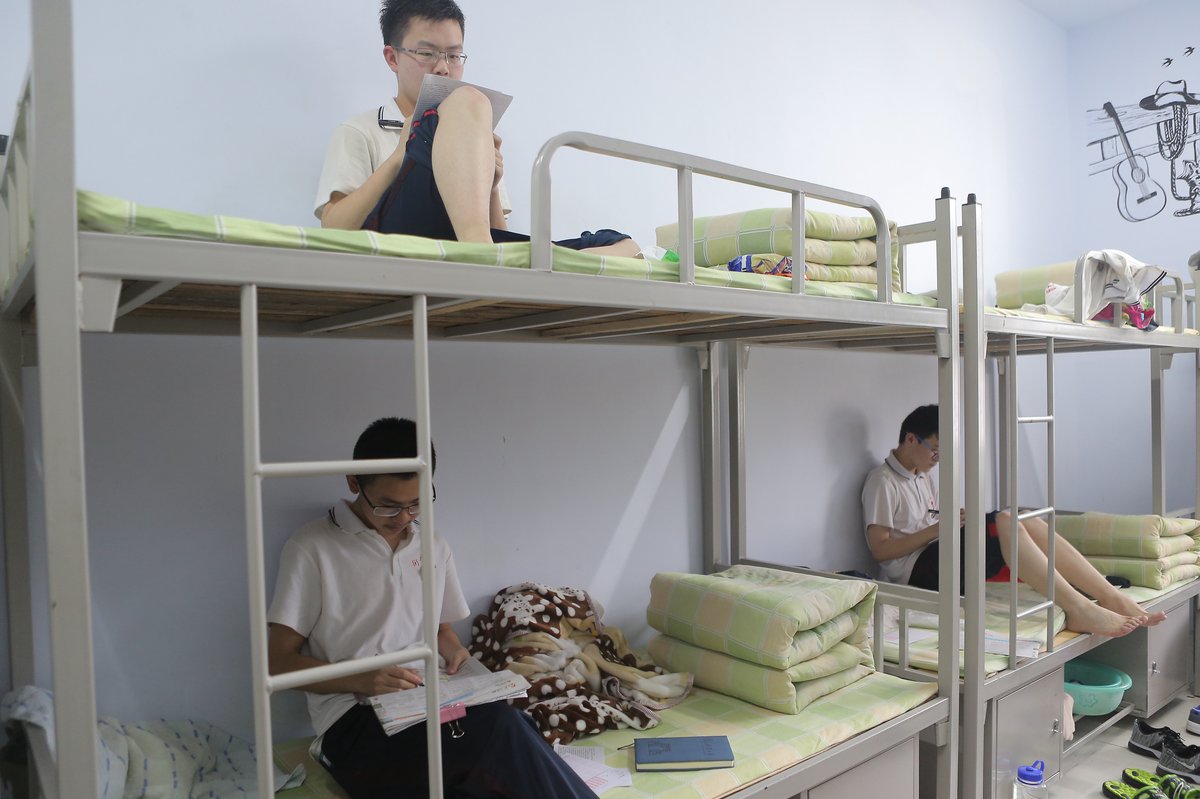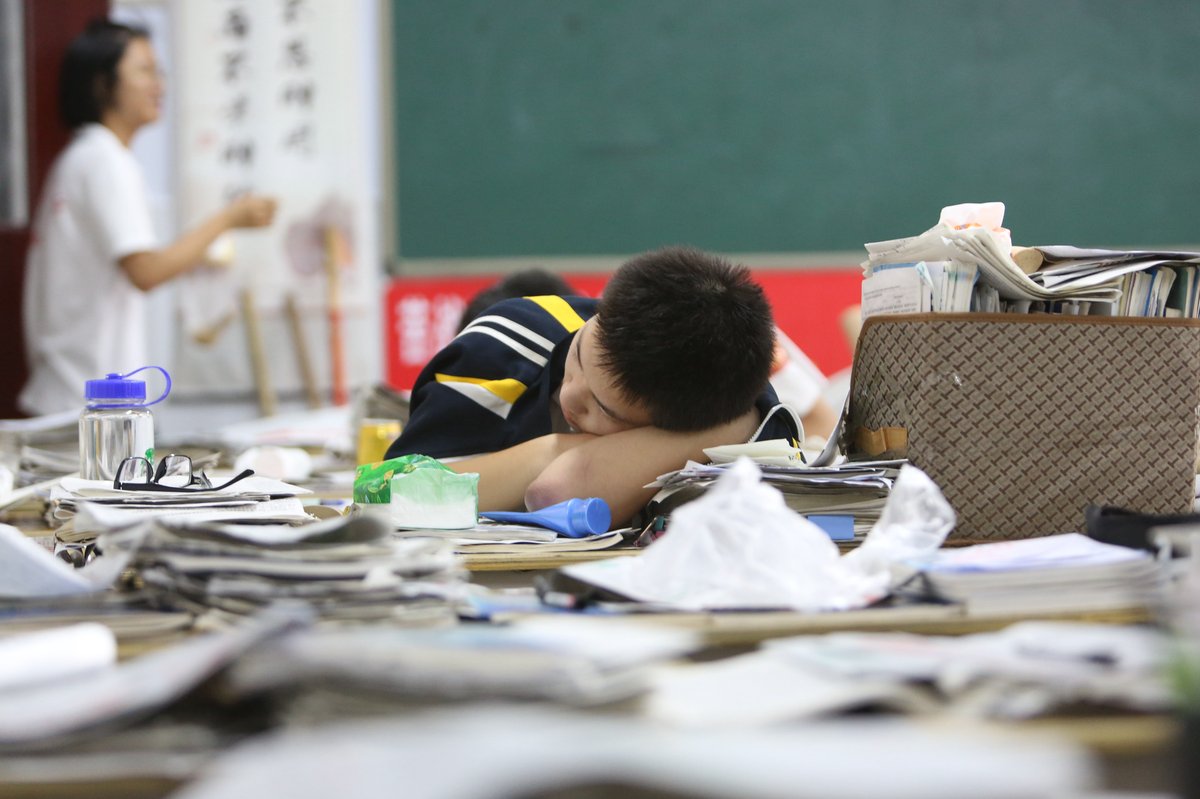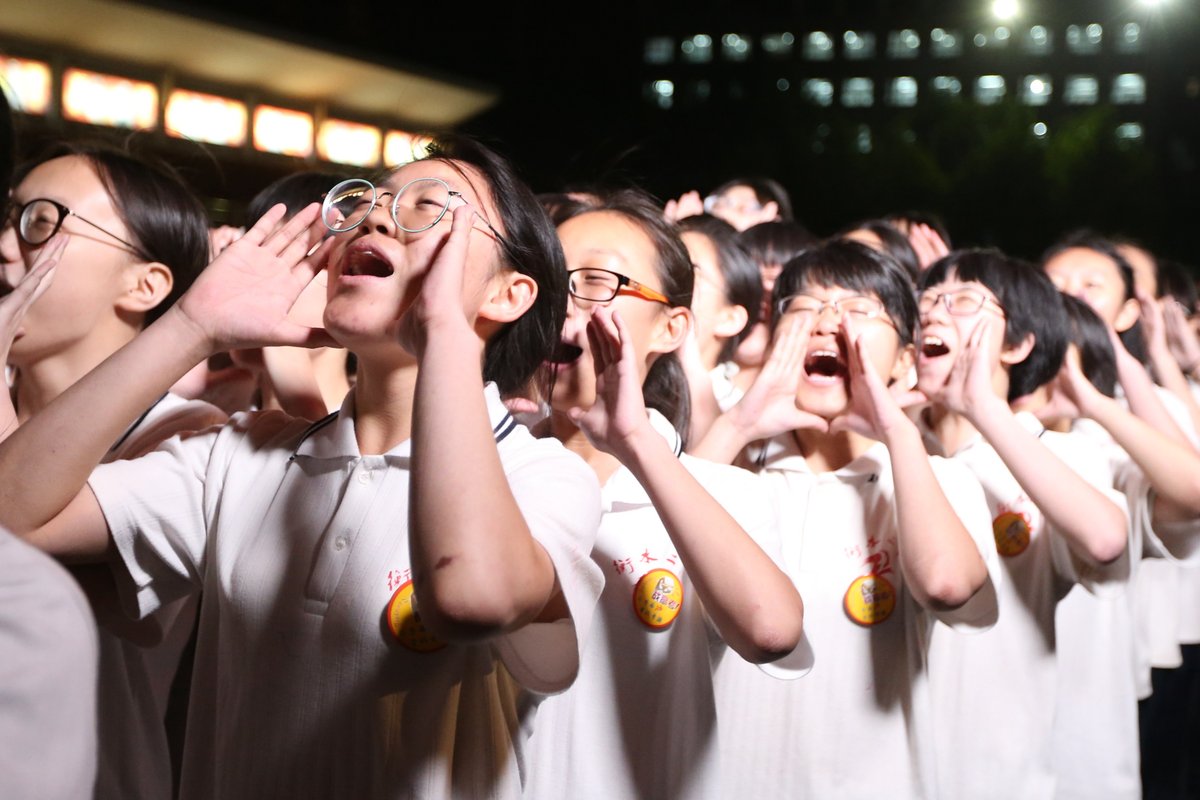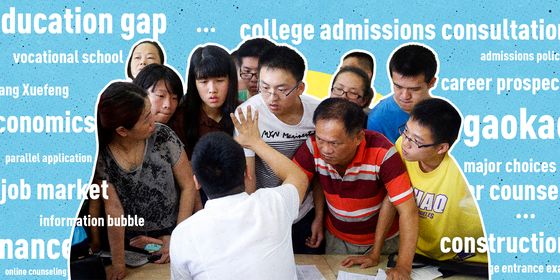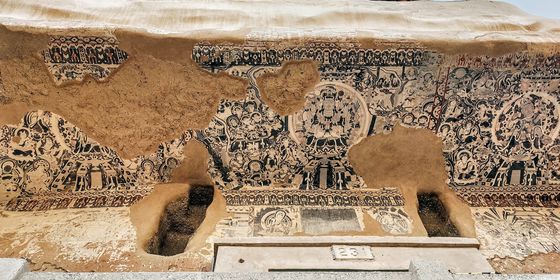A former students recounts her grueling schedule and eventual withdrawal from Hengshui, a city notorious for exam-prep schools
The 2022 edition of China’s National College Entrance Examination (gaokao) takes place from June 8 to 9 this year, with certain cities offering additional subject tests until the week’s end, and Shanghai postponing its exams until July due to Covid-19 restrictions. During this week, close to 12 million teens will be striving to achieve their best results on what for most will be the single factor deciding which university they will go to—or whether they go at all.
Such extreme stakes breed extreme measures: Across China, a number of high schools have gained fame (or notoriety) for their rigorous examination-prep methods that seemingly churn out expert test-takers. Apart from Maotanchang in Anhui province, the city of Hengshui in Hebei province is perhaps China’s most famous “gaokao factory.” It is known for having a rigorous curriculum based on repetition, military-style discipline, and even pep rallies and slogan-chanting, which allegedly succeeds in sending around 87 percent of students across its several high schools to so-called “first-tier” universities each year.
This reputation has attracted high school students from across China, as well as students wanting to retake the gaokao to improve their scores, to try to transfer to a Hengshui school in the hope of raising their grades. The following story is the first-person recollection of one such transfer student, who eventually rebelled against and left the Hengshui system, but continues to have questions about whether it was all worthwhile:
1/6
One morning in July before dawn, a dozen classmates and I boarded a coach in front of our school. By afternoon, we’d arrived at our destination: the gates of the Hengshui No. 2 High School.
Not long before, I’d signed myself up for an entrance exam, and earned the opportunity to transfer to one of Hengshui’s prestigious high schools. At the time I was totally ignorant of what this entailed; I just told my parents the news over the phone, packed my bags, and left.
Everything I knew about this school I’d heard from older students and teachers. Before every summer holiday, high school juniors flood into this minor city from all over the country. They say they are transferring to study, but it’s more like attending a boot camp. Hengshui would be their home for most of their final year of high school.
As I sat on the bus and waited, several students jogged out of the school building and escorted us off the bus one by one. My guide was a girl with short hair, glasses, and a very forthright manner. As she helped me carry my sheets, she introduced herself as He Zihan, and said the teacher had asked her to show me around. We’d drop off my things in the dormitory first, then go straight to the classroom.
From the outside, the dorms at No. 2 High School didn’t look very different from those at my old school, but once you enter, you realize how much neater it is. There was not a wrinkle in any of the sheets on the beds. The students had folded their quilts in a perfect rectangle, like a block of tofu, and they didn’t stuff junk under their beds, only a plastic basin and a few pairs of shoes. Looking at my own bags, which I’d dropped carelessly on the floor, I immediately felt like I was breaking some rule. After quickly helping me straighten up, He Zihan took me to our classroom. The wide hallway was flanked by classrooms on each side, but there were no windows in the hall. The lights were kept on all day long.
I seemed to be the first non-local student in this class. Entering from the back of the classroom, I saw everyone with their noses in their books. No one glanced my way. He Zihan dragged a desk to the back of the classroom, and I gingerly pushed a chair toward it. It gave a loud screech as it scraped the floor, and I jumped. But still, no one lifted their heads to look at me.
Soon, the speakers in the class began to play a recorded English listening practice. As I’d just arrived, I didn’t have the textbook to go along with the recording, so I could only doodle on some paper I’d brought. As soon as the recording ended, the classroom suddenly erupted with the sound of chairs and desk scraping, and the halls thundered with footsteps, as if many people were running at once.
In a minute, the noise had died down, and only half the students remained in the classroom. He Zihan had disappeared. Before I had figured out what was going on, a cardboard carton full of noodles materialized on my desk. Looking up, I saw He Zihan, apologizing, “I forgot to tell you. We buddy up to take turns fetching our meals from the cafeteria. I’m paired up with Lin Man, and it’s my turn to get our food today. You can join our group. We usually just bring breakfast and dinner here. You get your own lunch from the cafeteria.”
The students ate as fast as they fetched the food. When I was still halfway through my noodles, their desks were already spotless. The class representative began passing out mock test papers for us to complete in the evening, and the teacher walked in. His eyes seemed to immediately fasten onto my messy desk and half-finished dinner.
“C’mon, eat faster. Look, how many physics equations everyone else has done already!” The teacher didn’t speak harshly, but I was still nervous. I swallowed what was in my mouth, put my bowl on the floor beside my desk like the others, and flipped open my exam paper.
Later, the teacher called me over and asked me how I was doing. I stood with my hands behind my back, fidgeting, and said it was okay, there were just lots of things I was still getting used to.
“We sprint to eat here,” he explained. “New transfer students can leave five minutes earlier to get their food. If you can’t finish, you can keep eating after class. It’s important that you eat. You need the energy to attend all the classes, finish all the problems, and participate in physical exercises.”
I was all alone at this school, without the familiar faces of teachers and classmates I’d known before. I didn’t even know which class the other transfer students from my old school had been put in. This first conversation with my new teacher made me feel like a fish left gasping on dry land that’d been rescued and put back into the water. I was still alive, and I had to keep swimming.
2/6
I woke up at 4 the next morning. He Zihan had told me that it was against the rules here to get up before the alarm went off at 5:30. “You’ll get a demerit if you even put your clothes on before that time.”
I lay still on my bunk and stared at the ceiling for over an hour. Finally, a piercing ringing sound issued from the speakers, and I jumped up from my bunk. On the bunk below, He Zihan was already folding up her quilts, so I also began clumsily tugging on my sheets, pulling on my shoes...
By the time we jogged out of our room, the hallways were full of impatient students, as well as students on duty bringing trash out of the rooms. There was a traffic jam at the top of the stairs. The crowd behind me pushed me forward as I tried to find my footing. Finally, we made it out of the building, and we joined a bigger mass of students sprinting toward our meeting point.
Every student at this school is required to join in morning exercise. We don’t run on a sports track, but around the empty fields surrounding the school buildings. Every class ran in formation, forming two lines with a space in between.
Because I was new, there was no space for me in our class’s formation. I stood beside the lines and, copying the students around me, took out the reading we were sent last night. Holding the paper in my hands with my elbow straight, 45 degrees above my face, I began to read out loud.
The sports representative was a male student. When he came to assign me a place in the line, his eyes still looked half-closed and he had a definite case of bed-head. When we finally all got in formation, a teacher began to shout “one-two, one-two” to guide our marching. Her voice rang with power. I’d heard about the marching from an older student before I’d come to this school, and it was exactly as they had described: We lifted our legs so our thighs were parallel to the ground; the front arm went out 90 degrees, and the back arm 60 degrees. When the teacher shouted “one,” we put our left foot on the ground; on “two,” we lowered our right foot.
The teacher began shouting faster and faster, and I struggled to keep up. I began to lag behind the beat. Because the school uniforms were too big for me, every time I put my foot down, I stepped on the back of my pants and tried not to trip. I also stumbled over the slogan that He Zihan had taught me to shout: “Go No. 2 High! Victory for No. 2 High! No. 2 High is Number One!”
The sports representative stood beside me and reminded me to stay on beat, to lift my leg higher. “I know! I’m trying!” I yelled in frustration. My only consolation was that, since I was new, he couldn’t exactly punish me, so I continued to step at my own pace. Now and then I looked up, and once, I saw a familiar face in the class next to ours—a girl from my old school. But she didn’t look at me. That made me feel lonely.
My legs were already sore after the marching, but we had to start jogging right away. There was maybe half a foot of space between each student in the formation. I was in the outside line, so every time we turned a corner, I struggled to keep up. But I also couldn’t run too fast, or else I’d step on the shoes of the student in front of me. At this school, you’re punished if you lose your shoes during the jog: usually by being suspended from class and forced to stand out in the hallway for a day or several days; you aren’t allowed to do anything else while you stand. So even during physical exercise, I couldn’t let my brain relax for a second.
After a week, I gradually got used to the way of life at No. 2 High School. On some mornings after exercise, our homeroom teacher would call a class meeting where he would disparage, praise, or encourage individual students, as needed. I could picture the expression on his face just by hearing his voice, and it made my chest feel tight.
After the meeting, students returned to the classrooms for the morning reading session. At 6:30, the students responsible for fetching breakfast would dash toward the cafeteria with the freezer bags they’d prepared ahead of time. Those who weren’t on breakfast duty could go brush their teeth in the bathroom. While eating, everyone took out the practice problems they would be tackling during that day’s self-study period.
I didn’t usually go get lunch in the cafeteria after the morning’s classes ended, but returned to my dormitory to eat the snacks I’d hoarded there. This was the only way I could squeeze a quick wash of my hair with the cold water, as there wasn’t enough time in the evening. As soon as the bell rang for the afternoon nap, students had to be in their beds—a dorm matron would look in the window and check. After nap time, we returned to the classroom to sing our “class song,” and continued with our lessons.
I seldom took any naps at No. 2 High. At lunchtime, students usually took English and Chinese language practice problems to their dorm—what they jokingly called a “buffet”—there was rarely enough time to sleep by the time I finished them. On the rare occasion I did take a nap, I would be woken up by the piercing sound of the bell. It jolted me out of my rest and made me feel like every nerve in my body was a rubber band stretched tight, ready to snap.
We did English listening practice every night before dinner, and after dinner, it was self-study time. Our day ended at 10:10 every evening. Then we would wake up the next morning, and repeat.
Gradually, I got faster and faster at “running” for my meals. My bed was made neater and neater, the quilt more and more rectangular. But somehow, I started feeling like a fish gasping for air on dry land.
3/6
Every week, we took a mock gaokao quiz. Soon after I joined the school, I experienced my first one.
The mock quiz wasn’t very much like the real gaokao. The format of the questions was different. But there were as many questions on the quiz as our usual practices, so I could never finish it. The teachers at No. 2 High were fast at revisions. That first Sunday, I saw my rank in the class: second-last.
I snapped. All I could think of was leaving. The dinner He Zihan fetched for me was left uneaten on my desk as I waited for the homeroom teacher to appear. He finally came, and I ran out to meet him in the hallway. I started crying before I could even talk, but eventually conveyed to him, stuttering, that I wanted to borrow a phone to call my teacher at my old school.
“I want to go back, I’m doing so badly...”
“You’ve only done one test and you want to give up?” he asked. “Now, first calm down, and when you’ve stopped crying, I’ll let you borrow my phone, okay? Go wash your face and calm down a bit.” I did as he asked, and when I returned to the classroom, I’d stopped crying. The teacher brought out a chair for me and let me finish eating out in the hallway.
Not long after, the chemistry teacher invited me to the print room for a chat. He was a short, slightly chubby man with a kind smile. He made small talk, then told me about successful transfer students from the past, and told me not to be scared off. “It’ll be summer vacation soon, then you can go home.”
I didn’t end up making that phone call. The days that followed were uneventful, but I persevered. I made a phone call home a few days before summer vacation—it was the first time I’d called my parents since coming here.
Once we’d sat our final exams, our teacher told us that non-local students could leave that same day. Our school didn’t send a bus for us, so I and six other students from my old school decided to take the train. By the time we packed and arrived at the station, our train had already started boarding. We ran for the check-in counter and hurried onboard, as if we were fleeing from something.
It was 2 a.m. by the time I arrived home. I ate some food out of the fridge and got in bed, but had no desire to sleep at all. I thought of the mountain of summer homework I’d be assigned, and the final year of high school waiting for me at the end of vacation, and my insides curled up in anxiety. My tears started to fall, and I considered not returning to Hengshui once the term started again.
But I never vocalized this thought. At the end of summer, I returned to Hengshui. In our final year, more transfer students joined out class, so I no longer stood out.
Life at school was just as intense, uneventful, and tedious as ever. As I went through the motions each day, I realized my whole routine had been planned out for me, and all I had to do was follow. Gradually, I lost my perceptiveness of the outside world, as well as the desire to perceive it. I was like a puppet on strings.
The teachers at No. 2 High were all very attentive, but most of their energy was focused on the students ranked in the top 20 of the class. Among all the teachers, my homeroom teacher stood out. He always talked in a slow, leisurely pace, and would tell stories or show videos unrelated to our studies during class meetings. When it was his turn to monitor our self-study period, he would doodle on the mock exam papers. Sometimes, he rode his Segway scooter into the classroom.
But even so, he was our puppetmaster. Our lives were all in his hands.
4/6
We had a short holiday every month, starting from noon on Sunday and ending on Monday morning. I would arrange with a few friends to leave the campus together. As soon as we left the teaching building—before we’d even gone out the school gates—I started feeling like a different person. My heart was light as a cloud.
Laughing and chattering, we would head toward the nearest supermarket and come up with two large plastic bags of junk food each—that was to be my lunch for the next month. After that, we’d head to a hotel. As there are very few local students at Hengshui, hotels were our only option if we didn’t want to stay on campus on our night off. Every holiday, I imagined us fanning out all over the city.
After taking a quick nap, we would go shopping. The day would go by in a flash. In the evening, we would watch a movie in our hotel room and fall asleep draped haphazardly across the bed, each of us facing a different direction.
Almost always, I would be the first to wake up the next morning. I would stare at the ceiling, trying to suppress the anxiety I knew would soon bubble up inside me. I knew the holiday was ending and we were going back to “normal.” The previous afternoon was like a dream.
Because of this, to this day I don’t like staying in hotels. It gives me a feeling of good things about to come to an end.
Time passed quickly. In mid-October, it was time to sign up for the gaokao. The teachers from our old school came to fetch us. Our bus left Hengshui at 6 in the morning and arrived at 4 p.m. As we drove through the gates, I saw parents waiting with suitcases and packages in front of the teaching buildings. We didn’t even have time to talk with them after getting off the bus, but were hurried upstairs to get our pictures taken and signed up.
After that, I went to find my parents downstairs. They brought me winter clothes and shoes, and asked me how life was in Hengshui. They told me to eat well and stay healthy. We didn’t have much time to talk. As soon as all the students were registered, we had to go straight back.
We left at 5 p.m., and it was midnight by the time we returned to Hengshui. The girls’ dormitory was locked, and we couldn’t find the matron, so we slept in an empty classroom. It was cold in October. I sat on the floor with my back against the wall, willing myself to sleep. Half-awake, I heard a girl calling her parents with a sob in her voice. Another girl developed a fever. When we finally gave up trying to sleep, we paced back and forth in the hallway to stay warm.
The next morning, we didn’t take part in the mock test, but went to catch up on sleep in the auditorium. For the whole week after, I felt like a zombie. I didn’t know why we bothered hurrying back in the night. I didn’t know what students like us meant to the school. I felt like some ideal I had always believed in had collapsed.
5/6
We took a mock quiz every week, and a major mock exam every month. My grades were gradually improving. I was never in second-last place again. Oddly enough, my scores on the quizzes were mediocre, but I always exceeded expectations on the major monthly exams. No. 2 High only reported our major test results back to our original schools, so it gave our teachers the impression that we were doing very well.
After the winter holiday, we entered the final stretch before the gaokao. The atmosphere in the class grew more and more tense as we tackled more and more practice problems every day. Every second of our day had been arranged by our teachers, and I felt I had no energy left to identify my own weaknesses and try to make improvements. I simply allowed myself to be dragged forward.
By April, I was seriously wondering if the system at No. 2 High was right for me. Once this idea took hold in my brain, I couldn’t get rid of it. By this time, we were doing 15 mock tests per month. Not only did it feel like torture, but it also felt useless. I called my old teacher and told him I wanted to return home to prepare for the gaokao, but he told me I was just being emotional. I called him several times after that, but he just told me to wait a little longer.
I also called my parents, who told me they supported whatever I chose to do, but I knew that deep down, they didn’t really. There were many success stories among past transfer students, so they all thought staying in Hengshui was the better choice.
The closer we got to the exam, the more unstable my emotions. I was on a continuous roller coaster of hopes and disappointments. I started crying as soon as the self-study period started—and yet, my pen did not stop moving across the page as I answered the question. I started refusing to eat, inflicting pain on my own body to distract myself from the agony in my mind.
One evening, the English listening recording had already started before I realized I had to put away my math problems. But by that time, the English teacher had already noticed. She walked up to me and scolded, “Why are you still doing math? Don’t you know what time it is?”
I knew this teacher hated it when students used her class time to study other subjects. I stood up and apologized, and said I didn’t hear the bell ring.
“So how come everyone else heard it? Get out! Go stand outside! You’re excused from English classes for the rest of the week, and don’t bother coming to listening practice!” And then she raised her voice even higher. “Tell you what, from now on, all transfer students are excused from listening practice! And it’s all because of her!”
I didn’t care about being suspended from class. If No. 2 High had kicked me out then and there, I would have been much happier. But the way she decided to to punish all transfer students because of me was ridiculous.
“Please, miss, could I say something?” I was angry, and yet to my shame, I could not stop crying.
“What could you have to say? Get out, go stand facing the wall!”
I went out, wiping my tears. Standing beside me at the wall was a girl who’d gotten suspended because her shoe fell off during the morning jog. She was a quiet girl, soft-spoken and gentle. She asked me what I did, and I told her, sobbing, that I hadn’t take out my textbook in time. At this point the English teacher came out of the classroom and saw us whispering to each other, and told the other girl, “Stay away from her. Don’t talk to her.”
At that moment, I thought I’d become some sort of monster. I was someone you couldn’t approach, who had to be separated from the rest.
I started wanting to go home more and more. As May approached, I felt like it was my last chance. I called my old teacher again, and he started chewing me out over the phone. “You’re so selfish! You only care about yourself, you haven’t considered your teachers, your parents, your classmates! Haven’t you thought that if you came back early, that’ll discourage the other students? Have you told them what you were thinking?”
This is the first time my teacher had ever spoken to me so harshly. Besides shock, I felt angry, and my voice trembled as I said, “Sorry, sir. This is the last time I’ll call you. I won’t go back, and you don’t have to tell me when I can go back again. Thank you, sir. Goodbye.”
I hung up the phone and threw away my calling card, and right away I felt lighter. I had accepted my fate. Every day, I would brainwash myself: “My past self is dead. As long as I keep going, I can achieve my dreams.”
6/6
A few days later, my mother suddenly appeared in Hengshui. She said my old teacher had asked her to come see me. If I still wanted to go home, she would take me straight away.
Something I had desperately wished for for a month had just been offered to me: I was almost afraid to believe it was real. I took a walk with my mother, and she told me she would support whatever I chose. I also called my teacher, and he guessed that my indecision was born out of worrying about becoming the center of attention, how people would expect more of me after I came home. “That’s inevitable. It’s a gamble whether you stay or go. The decision is up to you.”
In the end, I ran back into No. 2 High School and packed up at lightning speed. I was fleeing again. On the train, I felt like I was dreaming: This morning I was still pep-talking myself; by evening, I was back in the home I’d dreamed of every day.
The next day, I returned to my old school. My classmates added a desk in the classroom for me. Almost everyone in school seemed to know who I was, even those whom I’d never talked to before. Wherever I walked, I could almost hear people whispering, “She’s the one who came back from Hengshui.”
Friends have asked me whether I regretted going to Hengshui. I said no—I wouldn’t be who I am today without that experience. I’d acquired a lot of knowledge and test-taking skills there. Perhaps I’d also matured.
A few days after I came back, we took a mock exam. I feel like I wasn’t the only person with their eyes on my test results—a lot of people wanted to see how I’d do. With this kind of added pressure, I knew I didn’t do very well almost as soon as I handed in the paper, yet I was strangely unconcerned. A few days later, the scores came out, and they were higher than I expected.
Everything seemed to have come full circle. I had gone away full of hopes for the future, and now I’ve returned, full of hopes. It wasn’t a struggle to get acclimated after I got back: I woke up earlier than I had at No. 2 High, and went to bed later, yet I didn’t feel tired at all. I finally had the right to arrange my own schedule, to prepare for the gaokao under my own motivation. During the final month before the exam, there were lots of mock tests, but I can’t remember any of my scores. During that time, I received help and concern from a lot of classmates, as if I had never left. Even to this day, I have never felt the kind of happiness and fulfillment as I did then.
After the gaokao, I closed the chapter on my high school life. Everything from Hengshui, from No. 2 High, faded from my memory. I never contacted my classmates from that school again. I don’t know which university they ended up at. When I think back on those memories, be they happy or bitter ones, I can’t make myself feel anything.
Occasionally, though, I will think about our monthly afternoons off, of going shopping with my friends. The streets would be full of people, many of them wearing our school’s uniform. The shopkeepers would be selling cloying sweet bean paste cakes, steaming sweet potatoes, and pet rabbits and hamsters in cages...
I want to go back there. I want to walk those streets again, and see if I can feel the happiness that I did then.
Written by Shu (树)
Names have been changed in the text





